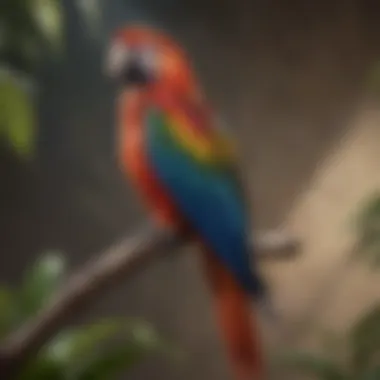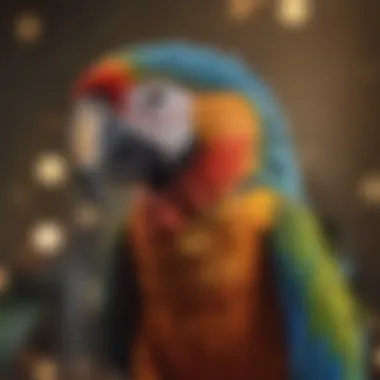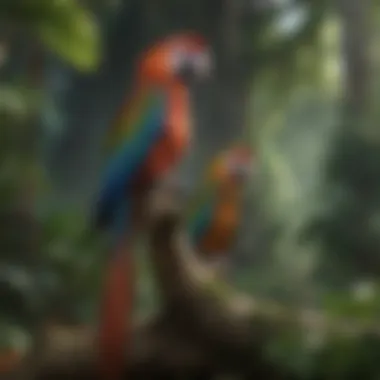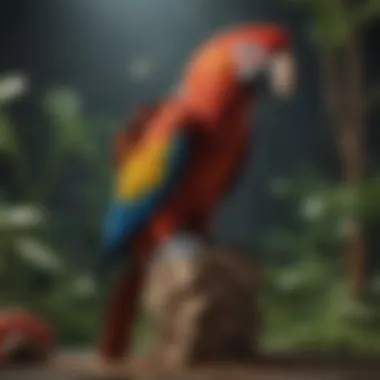Macaw Bird Cost: Essential Insights for Prospective Owners


Intro
Owning a macaw can be an enriching experience, but it involves understanding the full financial implications. From their purchase price to daily care needs, the costs add up. This comprehensive guide aims to help potential owners grasp the monetary commitment associated with macaws. It is essential to have a clear picture of not just the acquisition cost but also ongoing expenses for food, health care, and enrichment.
-> Fact: Macaws are among the one of the most expensive pet birds you can own, often costing anywhere from $1,000 to $3,000 depending on the species and age.
Understanding these costs facilitates informed decisions and a commitment to responsible pet ownership. This guide delves into various expenses and factors that can influence macaw prices while providing the necessary insights for those considering welcoming these vibrant creatures into their lives.
Care Tips
Caring for a macaw is a long-term responsibility that requires attention to detail and consistency. Ensuring proper daily routines is crucial for their health and well-being.
Daily Care Routines
Each macaw's daily care routine should include feeding, social interaction, and mental stimulation. They thrive on social interaction, so spending time with them is essential. Additionally, their cages should be checked for cleanliness each day.
Cage Setup and Maintenance
Choosing the correct cage for a macaw is an initial investment that later impacts maintenance costs. Their cages must be large enough to accommodate movement and exercise. It should be equipped with various perches and toys for enrichment. Regular cleaning is essential to prevent health issues.
Hygiene and Cleaning Practices
Maintaining hygiene not only ensures a healthy environment supreme for your macaw but also reduces ongoing costs related to vet visits. Cleaning the cage weekly and changing the bedding will go a long way towards keeping your pet healthy.
Seasonal Care Adjustments
Different seasons may require adjustments in care routines. For example, ensure hydration during heat waves and provide warmth in colder months. Adapting your routine can minimize long-term health costs.
Behavioral Insights
Understanding your pet's behavior is key for effective care. Macaws exhibit a range of behaviors that can misunderstand.
Understanding Bird Body Language
A bird's body language communicates many sentiments, from happiness to anxiety. Observing your macaw can offer insights into their emotional state. For example, ruffled feathers might indicate discomfort or fear.
Common Behavioral Issues and Solutions
Behavioral problems can arise in captivity, some of which may lead to regret for first-time owners. Common issues include excessive screaming or destructive actions. Understanding the root causes can lead to solutions, such as increased interaction or environmental enrichment.
Positive Reinforcement Techniques
Training a macaw involves patience and consistency. Using positive reinforcement can encourage desired behaviors without causing fear. This can develop a bond and improve communication.
Social Interaction Needs
Macaws are naturally social animals. Providing ample social opportunities can prevent feelings of isolation, one of the reasons for many behavioral issues. Engaging with them regularly enhances fondness and trust.
Nutrition Guides
Proper nutrition is vital for your macaw's quality of life. The right diet plays a significant role in their longevity.
Essential Diet Components
A balanced diet for macaws includes seeds, nuts, fruits, and vegetables. Each of these plays a critical role in their health, providing necessary vitamins and minerals.
Safe and Toxic Foods
Not all foods safe for humans are beneficial for birds. Knowing safe items such as apples, carrots, and green leafy vegetables is important, while also identifying toxic options like chocolate and avocado.
Supplements and Treats
Commercial bird food can often lack certain nutrients. Consult a veterinarian on appropriate supplements that cater to your macaw’s specific needs.
Feeding Strategies for Different Species
Each macaw species has unique dietary requirements. For instance, the dietary needs of a Hyacinth macaw may differ from those of an Blue & Gold macaw. Understanding the differences ensures their individual requirements don’t go overlooked.
Wellness and Health
A holistic approach to your macaw's health involves recognizing their needs for both physical and mental wellness.
Routine Health Checkups


Regular vet visits are an essential component of bird ownership. An avian vet can diagnose prevent settings improper health care easily forgotten.
Identifying Symptoms of Illness
Awareness of signs indicating illness is crucial. Changes in plumage, behavior, or eating habits may signal health issues requiring immediate attention.
Preventative Care and Vaccinations
Inquire about necessary vaccinations that will keep your pet healthy and reduce unexpected medical expenses in the long run.
Mental and Emotional Well-being
Macaws need stimulation and companionship. Engaging their minds is as important as addressing their physical needs to ensure they remain generally happy.
Enriching Activities
Engaging in enriching activities can enhance the quality of life for macaws. Fostering creativity can have direct benefits for macaw mental health.
Toys and Playtime Ideas
Invest in stimulating toys that offer challenges. Rotating toys keeps their environment fresh and interacting.
Training and Tricks
Regular training sessions not only teach your bird new skills but also nurture the bond between you. Simple tricks can infuse daily life with fun.
Outdoor Activities and Interaction
When safe, allowing your macaw to interact with nature can provide mental stimulation. Caution should always be taken when exposing them to the outdoor environment.
DIY Projects for Mental Stimulation
Consider creating enriching toys from household items. Constructing simple puzzles allows your macaw to engage physically and mentally.
Understanding these factors and aspects of ownership can effectively guide you through your journey with a macaw. With adequate planning, education, and insight, your macaw can have a thriving life with everything they deserve.
Intro to Macaws
While embarking on the journey of macaw ownership, it is paramount to establish an understanding of these magnificent birds before diving into their costs. This section provides crucial insights into the very nature and appeal of macaws, allowing prospective owners to develop a successful mentorship and lasting bond with their future companions.
Overview of Macaw Species
Macaws belong to the family Psittacidae, which encompasses a range of vibrant and large parrots native to Central and South America. Among the different species, some of the most well-known include the Blue and Yellow Macaw, Green-winged Macaw, and Scarlet Macaw. Each species boasts unique characteristics, habitats, and temperaments. This distinction not only reflects in their appearance but also in the demands and interactions they require from owners.
The Blue and Yellow Macaw, known for its striking coloration, is a highly social species. The Green-winged Macaw is renowned for its playful disposition and loyalty. Such variations among species can impact the initial attraction of a bird as well as its specific care requirements. Understanding these differences is fundamental in choosing the right macaw for an individual’s lifestyle and previous experience with birds.
The Appeal of Macaws as Pets
What makes macaws particularly compelling as pets is their remarkable intelligence and strong affections towards human interactions. Known for their playful and curious demeanor, they thrive in stimulating environments, engage in social bonds, and showcase impressive communication skills. Macaws can learn a variety of words and phrases, adding to the richness of their relationship with their owners.
However, owning a macaw is not a decision to be taken lightly. Potential bird owners should consider a few important factors such as:
- Lifespan: Macaws can live for up to 50 years, requiring long-term commitment.
- Social Needs: They require significant time and attachments, demanding an owner’s attention.
- Costs: Their expenses range from food to habitat maintenance and most notably, vet bills.
Considering the vibrancy and energy macaws bring into a home, many find these challenges worth their unparalleled companionship. After deliberating on the strong appeals of these birds, prospective owners can better assess if they are truly suited for this captivating commitment.
Initial Acquisition Costs
Understanding the costs associated with acquiring a macaw is vital for prospective owners. The initial investment provides insights into the economic commitment necessary for macaw ownership. This section focuses on key factors that contribute to acquiring a macaw, including Purchase Price Overview and Adoption and Rescue Options. Knowing these costs can greatly assist in long-term planning.
Purchase Price Overview
Cost by Species
The cost associated with different species of macaws varies significantly. For instance, a Blue-and-Gold Macaw typically has a starting price range of approximately $1,000 to $2,000. In contrast, a Hyacinth Macaw may command prices upwards of $12,000 due to its rarity and demand. The specific attraction towards particular species influences their prices; this also reflects their popularity among bird enthusiasts.
Different species offer distinct personalities and coloring, making some more desirable. Unique options also emerge based on local supply and breeders. Species considered as social and friendly, such as the Scarlet Macaws, often see increased pricing due to their reputable appeal and suitability as pets.
Benefits of understanding these disparities enable owners to adjust their expectations based on species characteristics. Conversely, it can also serve as a caution about budgeting for necessary economics, especially with rare species.
Age Considerations
When acquiring a macaw, age largely impacts their price. A baby macaw, most often more expensive than an older bird, appeals to many buyers, desiring a fresh bond. A baby can range from $2,000 to $3,500 depending on the species, while an adult may cost half as much or less. This can make adult macaws more attractive for those seeking to minimize their spending.


Owning an older macaw can come with additional advantages. Adults might have established temperaments, which ease their adjustment to a new home. Moreover, adult birds might come reassured of some vet history, especially if coming from a rescue scenario. However, they may also have behaviors that require patience and training. Therefore, it helps every potential bird owner to weigh between the anticipatory excitement of raising a chick and managing an older one.
Adoption and Rescue Options
Exploring adoption and rescue options presents a moral alternative and potential cost savings. Many macaws are available through rescue organizations or sanctuaries. The fees for adopting can vary, often ranging from $100 to $400, depending mainly on the condition and background of the birds.
Adoption not only saves financial costs but also provides a home to an animal in need. Volunteering or contributing to rescue organizations enriches the urgency of race in conservation. Furthermore, portions of adoption procedures come with reassurances asking for certain standard veterinary papers and supplies needed beforehand.
Ongoing Care Expenses
Ongoing care expenses are critical for anyone considering macaw ownership. These financial obligations extend well beyond the initial purchase price. They include factors like nutrition, housing, and medical bills, which play a large role in determining the true cost of supporting these exotic birds. Understanding these expenses is essential for ensuring a sustainable commitment to macaw care. Without proper budgeting, potential owners may find themselves overwhelmed by unexpected costs.
Food and Nutrition Costs
Quality vs.
Cost
When exploring food and nutrition costs for macaws, it is crucial to balance quality against cost. High-quality bird food is often more expensive, but it provides essential vitamins and nutrients that support a bird's health. Poor quality diets can lead to serious health issues for macaws, resulting in greater costs in the long run for medical care. Bird owners should refrain from viewing cheaper food options exclusively as savings. Investing in quality food typically leads to overall savings by promoting the well-being of their pets. This reduces veterinary bills related to malnutrition or obesity.
- Choosing premium brands often promises a better nutritional profile.
- Look for specialized diets designed for macaws, ensuring health and vitality.
Special Diets for Specific Species
Dietary requirements may differ between macaw species, which makes knowledge about special diets essential. For instance, blue-and-yellow macaws may require different foods than scarlet macaws. Preferences and specific needs can dictate the right food formulation necessary for health. Custom diets can improve life expectancy and reduce illness rates in birds.
- Specific dietary needs centered on fat, protein, and fiber reinforce bird health.
- Nutritional variances can greatly affect behavior and longevity. Paying close attention to species-specific needs is a wise step.
Housing and Enrichment
Cage Selection and Maintenance
Cage selection and maintenance are also vital components of ongoing costs. A well-chosen cage can offer safety and comfort for your macaw. An inadequate cage can lead to injury or boredom. Advice maintains that cages should grant ample space for movement and be made of safe and durable materials. Regular cleaning and maintenance include replacing worn-out items, which can propel additional costs but signal an investment in the bird's health.
- Strong cages with large bar spacing afford various activities for macaws.
- Birds benefit from larger spaces that enable freedom to explore.
Toys and Stimulation Needs
Toys offer stimulation, necessary for the mental well-being of macaws. These birds require challenges that entertain and engage their intelligence. Not having proper toys can lead to behavior issues due to boredom. It's common to rotate toys and introduce new ones regularly—all adding to the monthly budget. While these costs can appear minor, they accumulate over time and should be accounted for seriously.
- Engaging toys can deter destructive behavior while promoting cognitive skills.
- Creating a stimulating environment is landed through diverse activities and substitute options.
Medical Care Expenses
Routine Veterinary Care
Routine veterinary care emerges as a salient aspect of ongoing expenses. Regular check-ups for macaws can preempt problems that may escalate into grave health issues. Preventive care measures, including well-bird check-ups and vaccinations, can seem upfront costly; yet, they typically save owners more considerably through preventive tasks compared to reactive treatments.
- Preventive veterinary care provides security and well-being for owners and birds.
- Invest in an avian vet who specializes in macaws or exotic birds for optimal service.
Emergency Medical Costs
Emergency medical costs present hidden threats for macaw owners to consider. As resilient as macaws may seem, they can have sudden and severe health crises. Keeping sufficient funds for surprising treatments is a prudent approach. These unresponsive crises can shift stress from pet ownership when health investments are budgeted ahead of time.
- Recognize signs of distress promptly to mitigate risks and capture necessary actions quickly.
- Costs can skyrocket in emergencies, so planning ahead is essential to manage distress.
Settling into macaw ownership demands serious dedication not only in time but affording the financial aspects of ongoing care expenses. Proper preparations will foster not only the bird's management policies but improve the human-bird relationship. By comprehending these gradual expenditures correctly, owners can shower their winged companions with effective living practices.
Factors Influencing Macaw Prices
Understanding the factors influencing macaw prices is crucial for prospective owners. The cost of a macaw varies widely, influenced by various elements that potential buyers must consider thoroughly. These factors often reflect the rarity of the species, its availability, and the general market conditions. Equip yourself with the knowledge of these influences to help make better decisions and manage financial commitments.
Market Demand and Trends
Market demand is a significant driving force behind the pricing of macaws. As the interest in exotic pets rises, so does demand, particularly for certain species like the Blue-and-Yellow Macaw or the Scarlets. Popularity fluctuates based on aesthetics, social media trends, and even shows and movies that feature macaws prominently. This rise in demand often leads to higher prices, particularly if the supply of a specific breed does not keep pace.
- Popularity Factors: Trends in pet ownership can rapidly shift. You may notice trends through social media platforms or events promoting particular species.
- Seasonality: Certain times of the year, such as holidays or breeding seasons, can affect availability, often causing prices to test fluctuations.
Overall, buyers should remain informed about these trends to budget effectively for their future macaw family members.
Geographical Variations in Cost
The cost of macaws differs from region to region due to several factors. Geographic location can significantly dictate pricing based on the distance from breeders to potential owners and their access to local markets. For instance, purchasing from a prominent breeder in an urban area may yield a higher price compared to a breeder located in a rural region.


- Transport and Logistics: The cost of transporting macaws influences prices. Areas with higher shipping costs may add fees to the final purchase price.
- Local Veterinarian Support: If a community has ample avian veterinarians and breeding facilities, it might lead to a competitive pricing structure, potentially lowering costs.
Though this region-based pricing could allow for bargains in certain cases, it's essential to ensure that the macaw's origin is ethical and reputable ahead of a purchase.
Breeder Reputation and Practices
The reputation of breeders plays a pivotal role in determining macaw prices. Reputable breeders invest significant efforts in their birds' care, health, and genetic background. For this reason, their birds tend to be priced higher, reflecting the quality of care and attention they offer.
- Health Guarantees: Breeders who offer health guarantees or comprehensive onboarding for new parents can justifiably price their birds higher because they assure buyers of quality. This status does not just cover the purchase cost but also factors into ongoing care expenses, advocating for proper care practices.
- Ethical Practices: Birds bred openly and ethically without forceful captive practices command higher prices. Investors should prioritize ethical breeding sourced community-oriented breeders who practice transparent operations.
Ultimately, investing in a reputable breeder not only provides peace of mind but also signifies long-term economic assurance for any potential problems that arise after placement.
Purchasing a macaw is not solely about the initial cost; understanding these factors offers insights for ensuring a healthy and sustainable ownership.
Budgeting for a Macaw
Budgeting for a macaw is vital. This financial analysis ensures prospective owners understand their responsibilities toward owning these birds. The costs accumulate over time; thus, careful planning helps mitigate unforeseen financial burdens. Owning a macaw involves one-time setup expenses and recurring monthly and annual costs, all of which can strain budgets if not anticipated.
When adopting a macaw, its initial cost isn’t the only concern. Owning this species demands a long-term financial commitment. Expenses can arise from food, healthcare, cage maintenance, and toys. Each of these elements requires adequate financial preparation to provide a nutritious diet and to address health needs.
By budgeting correctly, owners can enjoy their time with macaws, fostering stability in their lives. Below, we break down the different financial elements considered during budgeting.
Initial Setup Costs
Initial setup costs surround the purchase or adoption of the macaw, housing, and other essentials. Various expenses come into play here.
- Cage: Selecting an adequate cage is non-negotiable. It must be spacious, durable, and safe. High-quality cages can cost anywhere from $150 to over $1,000, depending on the macaw species.
- Food and Supplies: Start with purchasing essential equipment. This includes food dishes, water bowls, and any necessary items for cooking meals at home. Organic bird food options and fresh fruits can lead initial purchases, costing from $50 to $100 upfront.
- Healthcare Costs: A new owner should plan for veterinary costs, which may vary based on region. Initial vaccinations or health assessments may range from $75 to $200.
It’s advisable to establish a buffer in the budget, ensuring there are funds for unexpected costs during the first few months after acquiring the bird.
Monthly and Annual Expense Planning
Once the initial setup is completed, a focus on ongoing monthly and annual expenses is crucial. This will streamline future budgeting.
- Monthly Food Costs: A diet for a macaw includes regular bird pellets, with natural fruits and veggies contributing to their nutritional needs. An estimated costs for quality food could be around $30 to $50 monthly.
- Routine Healthcare: Monthly budgeting should also consider health and wellness check-ups, which can range from $10 to $30 when spread over the year.
- Supplies Duplication: Expect to replace toys and enrichment items. A yearly budget of $200 might be a benefit for regular updates.
Through comprehensive monthly and annual expense planning, potential owners can establish financial security while enjoying their time with macaws. This awareness of continual financial responsibility contributes significantly to achieving a satisfying life with this beautiful companion bird.
Proper budgeting sets the foundation for happiness and commitment between macaw and owner.
Resources for Future Macaw Owners
As potential macaw owners consider their options, having access to the right resources can significantly enhance their experience and ensure successful ownership. This section highlights the value of reliable information and connections. Adopting a macaw can be a long-term emotional and financial commitment. Therefore, equipping oneself with quality resources, whether it's understanding behavior, care needs, or financial commitments, is essential.
Links to Reputable Breeders and Rescues
Finding a reputable breeder or rescue organization is crucial for first-time macaw owners. Engaging with well-established and responsible breeders enables potential owners to make informed decisions. These professionals provide healthy birds and certain assurances regarding their well-being and genetics. It’s important to ask breeders about their practices, including:
- The socialization of the birds from an early age
- Comprehensive health checks during their life
- Documentation regarding parentage and breeding practices
Rescue organizations are also invaluable resources. They often have a diverse range of macaws available and help provide homes for displaced animals. Taking this route not only helps the birds in need, but offers a chance for responsible ownership at a possibly reduced rate. Some effective starting points to find reputable resources are:
- The American Federation of Aviculture
- Local and national bird rescue networks, which often have online platforms detailing available birds
While researching, be cautious of red flags such as overly high prices or vague histories regarding the bird’s background.
Recommended Reading and Guides
Delving deeper into macaw ownership requires continuous learning. Comprehensive resources can help future owners understand everything from feeding needs, housing specifications, to behavioral nuances. Guides and books specifically focusing on macaws can include crucial insights like:
- Nutrition management, understanding which foods are essential
- Behavioral quirks and training methods
- Enrichment strategies for your macaw's well-being
Consider some established titles like "Macaws: Care Guide and Basics" and engaging online forums found on platforms such as reddit.com. These spaces often host rich discussions where current owners share their experiences, enriching the learning experience even more.
Furthermore, keeping sight of the latest updates from experts in avian care through sites like britannica.com and wikipedia.org can provide ongoing education.
Following the compass of reputable resources ensures thoughtful preparation for the journey of macaw ownership. This minimizes unplanned challenges, enhancing delightful experiences in the long-term harmony between macaws and their owners.
Ending
The topic of conclusion here in this article is crucial for anyone considering bringing a macaw into their life. Owning a macaw is not simply a delight. It requires a clear understanding of costs involved. Numerous factors influence macaw ownership beyond only purchase price. Ongoing expenses can be substantial; thus, making educated decisions is essential.
Making use of the insights shared previously will lead to better choices. You must think about initial acquisition costs, regular care, and potential veterinary fees. Each species has its specific needs and costs associated with maintenance and care.
Important takeaways for macaw ownership:
- Analyze all long-term costs, not just upfront.
- Research on species-specific welfare needs.
- Calculate a realistic budget including space for emergencies.
The beauty and personality of macaws create a captivating pet ownership experience. Nevertheless, if you don't adequately prepare, the financial burden may become overwhelming. List down essential expenses to better manage the budget, ensuring that all necessary areas are covered. The enjoyment macaws can offer is significant, but the responsibility you take on is equally important. Understanding your financial commitment paves the way for healthy and fulfilling companionship.















